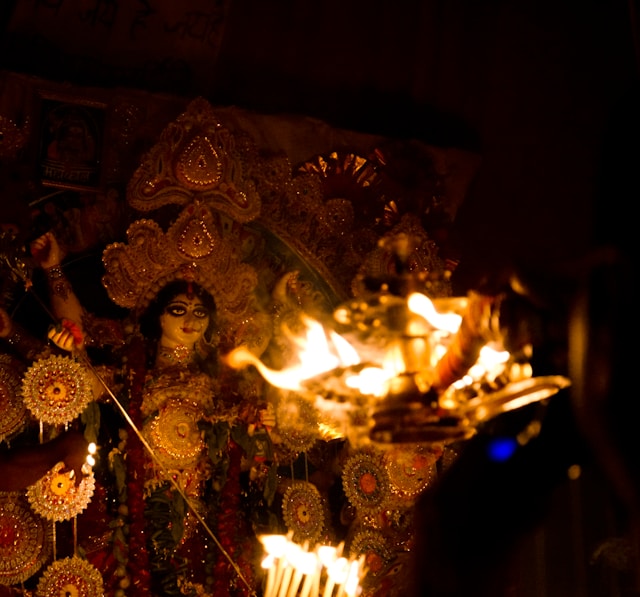Maha Navami, the ninth day of the Durga Puja festival, is a spiritually charged day that celebrates the culmination of devotion and the definitive victory of good over evil. It is the day when the Goddess Durga is worshipped in her most powerful and victorious form, as Siddhidatri, the granter of boons, wisdom, and spiritual success, marking the completion of the arduous spiritual sadhana (discipline) observed over the prior eight days.
Spiritual Significance of Maha Navami
Maha Navami is a day to internalize the Goddess’s victory, seeking her ultimate blessings for wisdom and spiritual fulfillment.
- Form of the Goddess Worshipped: On this day, the Goddess is primarily invoked as Mahishasura Mardini (the Slayer of Mahishasura) in celebration of her triumph. Many traditions also revere her ninth Navadurga form, Goddess Siddhidatri, the bestower of boons, wisdom, and spiritual success (siddhi).
- Symbolism of Triumph: The day commemorates the Goddess’s strength and her complete triumph over evil, representing the establishment of righteousness (dharma) in the world and within the devotee’s heart.
- Seeking Enlightenment: Devotees are encouraged to reflect on cultivating inner strength and virtue, recognize the all-encompassing divine feminine energy (Shakti), and seek blessings for enlightenment and prosperity.
Maha Navami Rituals
Maha Navami is defined by profound rituals that solidify the devotee’s connection with the victorious Goddess:
-
Sandhi Puja
Though traditionally performed at the tail end of Ashtami, this crucial 48-minute rite, performed at the juncture of Ashtami and Navami (tithis), is considered the foundation of Navami’s power.
Offerings of 108 lotuses, the lighting of lamps, and fervent mantra recitation commemorate the fierce moment when Durga vanquished the demons Chanda and Munda.
-
Navami Homa (Sacred Fire Ritual)
A sacred fire ritual is central to Maha Navami, performed for purification, prosperity, and divine blessings. The offerings into the fire (such as ghee and rice) symbolize the devotee’s submission and the burning away of impurities, leading to health and abundance.
-
Balidan (Symbolic Sacrifice)
While historically involving animal sacrifice, contemporary practice emphasizes non-violence. Symbolic offerings like fruits, vegetables, or pumpkins are made to represent the renunciation of ego, negative qualities, and animalistic tendencies within the devotee.
AI-generated image created with Google Gemini, January 27, 2026
-
Bhog and Prasad Distribution
Elaborate offerings (bhog) prepared for the Goddess are distributed widely as prasad (sanctified food), expressing gratitude and allowing the community to partake in divine blessings.
Sacred Recitations and Chanting
The chanting of mantras on Maha Navami reinforces the connection with Goddess Siddhidatri, the bestower of all spiritual and material perfections.
Goddess Siddhidatri Mantra:
Siddha Gandharva Yakshadyairasurairamarairapi
Sevyamana Sada Bhuyat Siddhida Siddhidayini
Meaning: May the ever-worshipped Siddhidatri, by Siddhas, Gandharvas, Yakshas, Asuras, and Amaras. The giver of all accomplishments, grant me success.
What to Follow (Dos)
- Maintain purity in the home, body, and mind, symbolizing readiness for divine blessings.
- Participate wholeheartedly in rituals, reciting mantras and hymns with sincerity.
- Honor young girls during Kumari Puja, offering food and respect.
- Engage in acts of charity, humility, and compassion, strengthening personal and community dharma.
- Observe fasting or mindful eating before and during rituals to enhance spiritual focus.
What to Avoid (Don’ts)
- Refrain from non-vegetarian food, alcohol, or intoxicants during Navami.
- Avoid anger, quarrels, or distraction while performing puja rituals.
- Do not disrespect women, young girls, or anyone involved in the rituals.
- Ensure tools, instruments, and sacred objects used in Ayudha Puja remain untouched for mundane use during the ritual period.
- Avoid performing rituals without faith, devotion, or proper intent—sanctity and sincerity are paramount.
Maha Navami is a day of powerful worship and inner renewal, unifying heartfelt devotion, disciplined ritual, and profound respect for Shakti as the embodiment of ultimate victory and success.
Feature Image Credit: Photo by Kanishk Agarwal on Unsplash. (free for commercial use)
